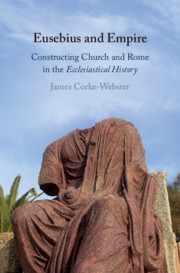Refine search
Actions for selected content:
23990 results in Ancient history
1 - Riding for Rome
- from Part I - The Republic
-
- Book:
- A History of the Roman Equestrian Order
- Published online:
- 21 December 2018
- Print publication:
- 10 January 2019, pp 29-69
-
- Chapter
- Export citation
Introduction
-
- Book:
- Eusebius and Empire
- Published online:
- 04 January 2019
- Print publication:
- 10 January 2019, pp 1-10
-
- Chapter
- Export citation
4 - Pathways to the Principate
- from Part II - The Empire
-
- Book:
- A History of the Roman Equestrian Order
- Published online:
- 21 December 2018
- Print publication:
- 10 January 2019, pp 157-203
-
- Chapter
- Export citation
11 - Governors and Generals
- from Part IV - The Late Empire
-
- Book:
- A History of the Roman Equestrian Order
- Published online:
- 21 December 2018
- Print publication:
- 10 January 2019, pp 485-552
-
- Chapter
- Export citation

Eusebius and Empire
- Constructing Church and Rome in the Ecclesiastical History
-
- Published online:
- 04 January 2019
- Print publication:
- 10 January 2019
Appendix 12 - Selections from 1 Clement
-
- Book:
- An Introduction to the New Testament and the Origins of Christianity
- Published online:
- 10 September 2019
- Print publication:
- 03 January 2019, pp 602-605
-
- Chapter
- Export citation
26 - Judaic Christianity
-
- Book:
- An Introduction to the New Testament and the Origins of Christianity
- Published online:
- 10 September 2019
- Print publication:
- 03 January 2019, pp 389-398
-
- Chapter
- Export citation
Chapter 3 - The Establishment Team
- from Part I - Background
-
- Book:
- Nero
- Published online:
- 17 December 2018
- Print publication:
- 03 January 2019, pp 56-80
-
- Chapter
- Export citation
17 - The Book of Acts
-
- Book:
- An Introduction to the New Testament and the Origins of Christianity
- Published online:
- 10 September 2019
- Print publication:
- 03 January 2019, pp 267-290
-
- Chapter
- Export citation
Part VII - Proto-Orthodox Christianity
-
- Book:
- An Introduction to the New Testament and the Origins of Christianity
- Published online:
- 10 September 2019
- Print publication:
- 03 January 2019, pp 435-436
-
- Chapter
- Export citation
Preface
-
- Book:
- Nero
- Published online:
- 17 December 2018
- Print publication:
- 03 January 2019, pp xiii-xiv
-
- Chapter
- Export citation
4 - Varieties of Second-Temple Judaism
-
- Book:
- An Introduction to the New Testament and the Origins of Christianity
- Published online:
- 10 September 2019
- Print publication:
- 03 January 2019, pp 46-61
-
- Chapter
- Export citation
Preface to the Second Edition
-
- Book:
- An Introduction to the New Testament and the Origins of Christianity
- Published online:
- 10 September 2019
- Print publication:
- 03 January 2019, pp xi-xii
-
- Chapter
- Export citation
15 - The Apocryphal Jesus
-
- Book:
- An Introduction to the New Testament and the Origins of Christianity
- Published online:
- 10 September 2019
- Print publication:
- 03 January 2019, pp 241-246
-
- Chapter
- Export citation
Illustrations
-
- Book:
- An Introduction to the New Testament and the Origins of Christianity
- Published online:
- 10 September 2019
- Print publication:
- 03 January 2019, pp vii-x
-
- Chapter
- Export citation
Introduction
-
- Book:
- Nero
- Published online:
- 17 December 2018
- Print publication:
- 03 January 2019, pp 1-4
-
- Chapter
- Export citation
Appendix 9 - The Didache
-
- Book:
- An Introduction to the New Testament and the Origins of Christianity
- Published online:
- 10 September 2019
- Print publication:
- 03 January 2019, pp 583-590
-
- Chapter
- Export citation
3 - Basic Second-Temple Judaism
-
- Book:
- An Introduction to the New Testament and the Origins of Christianity
- Published online:
- 10 September 2019
- Print publication:
- 03 January 2019, pp 32-45
-
- Chapter
- Export citation
Chapter 16 - Conclusion
- from Part III - End
-
- Book:
- Nero
- Published online:
- 17 December 2018
- Print publication:
- 03 January 2019, pp 416-421
-
- Chapter
- Export citation
Index
-
- Book:
- An Introduction to the New Testament and the Origins of Christianity
- Published online:
- 10 September 2019
- Print publication:
- 03 January 2019, pp 615-630
-
- Chapter
- Export citation
